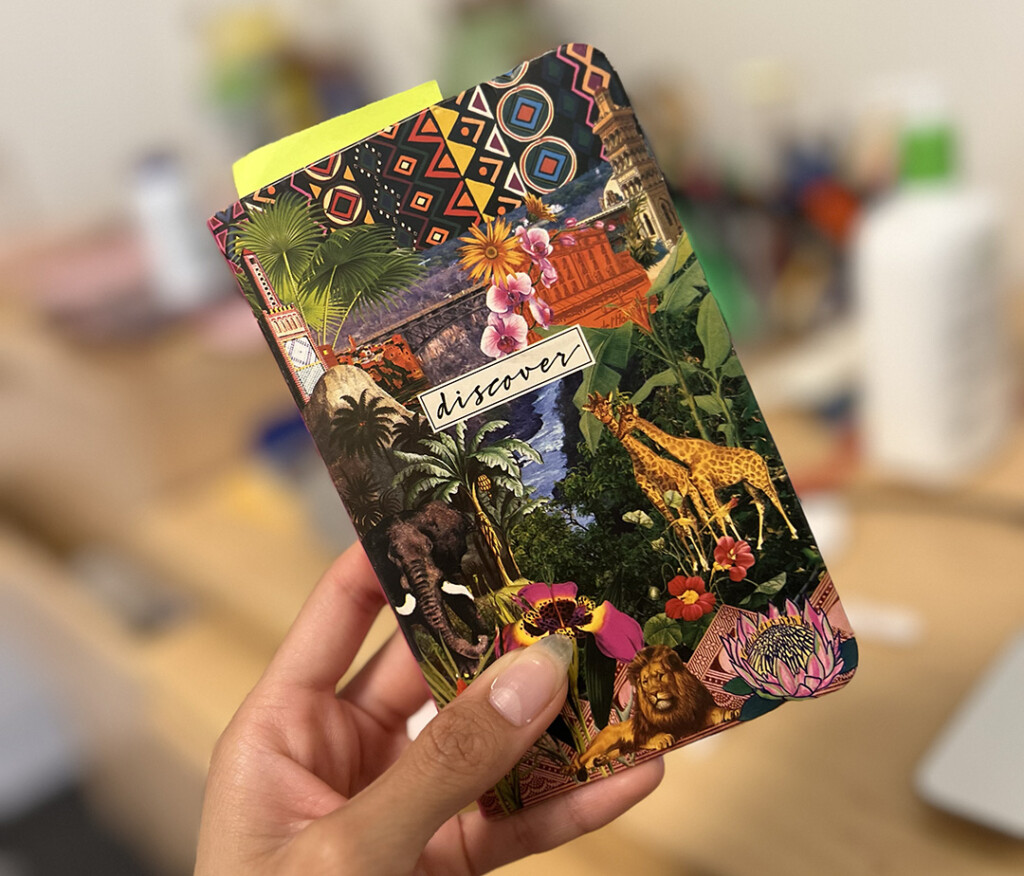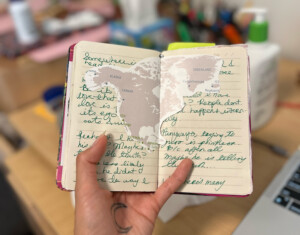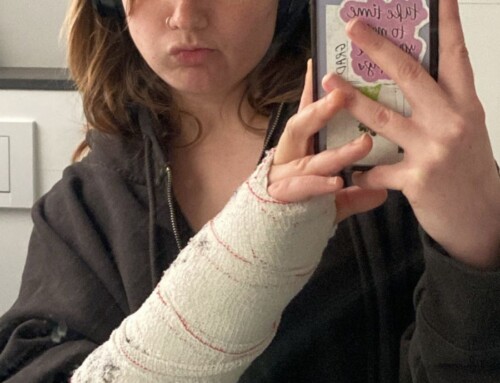Written by Jenny Lopez (UC Los Angeles), winner of The Californian Abroad Blog Contest (2024)
As a student with a mental health disability, I faced a harsh reality—study abroad seemed out of reach. I thought studying abroad was an exclusive adventure for the students who had more time and fewer transitions to worry about.
I was a transfer student adapting to the quarter system, navigating the massive UCLA campus, and juggling thousands of possibilities: clubs, courses, and organizations, and I was overwhelmed. It was a risky decision to make, and I asked myself tough questions: What about therapy and medication? Can I really handle this?
And yet, here I am. Post-study abroad and a senior on the cusp of graduating, urging you not to let your worries stop you from pursuing an experience abroad. No club, no class, and no social event can compare to the transformative experience of studying abroad.
You don’t have to let worries stop you from enjoying this once-in-a-lifetime opportunity! It was the best investment I ever made in my personal growth and mental health journey!
From fellow human to human – you deserve a reward for all that hard work and the sacrifices you’ve made. You deserve this. You are worthy.
As someone who lives with PTSD and depression, I know how daunting the idea of studying abroad can be.
- Will I be able to focus?
- Can I manage without my support system?
- What happens if something goes wrong?
- What if my mental health struggles interfere or get worse?
Living with a unique mental health experience means our lives are different. We aren’t neurotypical; we rely on systems to stay grounded and connected to our very personal growth and healing journey. I had all of these fears too.
Studying abroad means waking up to new adventures every day. You step out of your comfort zone and into a world of magic.
As someone who manages a mental health disorder, I’m sharing the list I compiled for myself before my travels. It was my plan while abroad, and I’ve refined it since returning to the States after reflecting on my experience.
Here’s how I took care of my mental health while studying abroad. You can do this!
1. Exercise the word “No”
When I first arrived in Madrid, Spain, I was exhausted. The moment the plane landed, everyone around me wanted to go out immediately.
I understood their excitement, but I felt pressure and worry about missing out (good old FOMO). Still, ultimately I knew that listening to my body and saying “no” when I needed to was a critical boundary to prioritize my well-being.
Practice saying the word “no” when it’s critical for your mental health – you won’t regret it.
2. Schedule self check-ins
Regularly checking in with yourself helps you stay on top of your mental health. Ask yourself how you’re feeling and what you need.
Better yet, schedule these on your planner and create a new healthy habit! It prevents issues you hadn’t thought about (because it wasn’t prioritized) from escalating and it strengthens your self-awareness and personal mental health care practices.

3. Pack a journal
Studying abroad is a fast-moving adventure in new experiences. Writing down your thoughts, feelings, and interpretations can be incredibly therapeutic and helpful for processing all the things that happen on study abroad.
I took a small journal with me everywhere, and it quickly became a best friend, holding the secrets and offering a space for reflection and healing. A journal will be a first friend, but it won’t be your last. This journey is filled with unique experiences and it deserves to be documented. You’ll look at it long after you return.
4. Practice mindfulness and mindful breathing
Trust me when I say that practicing mindfulness and mindful breathing can be your secret weapon to staying calm, focused, and happy while you’re exploring the world—especially when tough moments occur.
Mindfulness is a skill and a powerful one at that!
Practicing mindfulness allows you to enjoy each moment while avoiding stress. It helps you stay focused, manage your time better, and create lasting memories. Taking deep breaths while looking at a beautiful landscape allows you to fully absorb and appreciate the beauty around you. Spending some quiet time breathing deeply in a safe place (think wrapped in cozy blankets in your apartment) teaches you to be a rock for yourself.
Pro tip: Don’t forget to pick up that journal in these moments; writing is a form of mindfulness too.
5. Exercise gratitude
This may sound cheesy, but give me a minute. Listing the beautiful, surprising, and amazing things around you can be a real refresher, especially when battling a mental health episode.
When you’re traveling the world, and trying hard to take in everything around you, it can be easy to take those moments for granted.
Stopping to exercise gratitude is a helpful pause. It allows you to stop and gaze at the new environment with kind eyes, and this will deeply improve your overall well-being. it also helps you form deeper connections and maintain a positive outlook. Regularly writing down what you’re grateful for nurtures a happier and healthier study abroad experience.
6. Go on solo adventures
Spending time alone is highly underrated. When you’re studying abroad, things can get overwhelming pretty quickly. If you’re sharing a room with someone else, it can feel like there’s nowhere you can go for a moment of quiet time or peace.
When my social batteries ran out and I needed the comfort of solitude, I took solo adventures.
My once-a-week solo outings saved me and gave me some of my fondest memories. You won’t regret the time you spent with yourself on that walk or with that cup of coffee in a cafe, watching people go by.
Making memories on your own helps build a strong relationship with yourself and gives you a breather from the fast pace inherent in studying abroad.

7. Map out your zen spots
Identify the calming places that help you unwind and recharge. They may be quiet cafes, or a serene park, or a tranquil spot by the river. These havens will be your go-to places when you need a mental break.
Exploring your new environment and discovering these peaceful corners can be a delightful adventure in itself!
Make notes of spots that make you feel the most relaxed and at ease. Maybe it’s a cozy bookstore on a rainy afternoon, the botanical garden on a sunny one—these sanctuaries can help you manage stress, reset your chaotic mind, and keep you grounded in the midst of the excitement and challenges of study abroad.
8. Find your support group and stay connected with loved ones
This is a two-part tip because you arrive with people who love you back home, and you’ll make new friends while abroad. Finding your support group means surrounding yourself with the people who can empathize with your feelings of homesickness, culture shock, or stress. They can offer a shoulder to lean on during tough times while also sharing your excitement about the abroad experience.
Don’t forget to stay connected with your loved ones back home. Initially, being in a new country can feel isolating without your usual support system. Regularly checking in with friends and family can alleviate homesickness and help you with the transition, but those same people may have trouble understanding culture shock or the stress of navigating a public transportation system.
It’s reassuring to know that no matter where you are in the world, your loved ones are just a call or a text message away – ready to offer support and share in your adventures.
9. Seek help if you need it
There’s no shame in needing extra support no matter where you study abroad. Universities around the globe offer counseling services for this reason, and if you’re feeling overwhelmed, it’s important to be proactive.
Familiarize yourself with the mental health resources available at your host institution, including counseling centers and peer support groups, before you leave. UCEAP offers mental health support services, and Lyra, a global mental health service, you can access while abroad. These services are especially important to have on hand if you are studying abroad in a country that has less support available for students in need.
Don’t wait until things escalate. If you find yourself struggling, talk with someone early. Asking for help is a sign of awareness and strength, not weakness.
By addressing your mental health needs, you are ensuring that you can fully embrace and enjoy the study abroad experience.
10. Create a safety plan for emergencies
Mental health emergencies can happen unexpectedly, and having a plan in place that gives you clear steps to follow and the resources you can use will give you a sense of control and empowerment. With your mental health provider back home, create a safety plan and share it with your friends and family. Knowing who to talk to and what immediate steps you can take will ensure that a mental health emergency doesn’t derail your entire study abroad experience.
Finally, don’t let your mental health stop you from studying abroad! If you are living with a diagnosis and on the fence about going abroad remember this: the world is full of incredible experiences waiting for you. With a solid mental health plan in place, you can navigate the challenges and fully embrace the adventure.
Trust yourself, take that leap, and watch as you grow in ways you never imagined!
Being able to take care of my mental health while abroad strengthened my confidence and taught me resilience. It helped me discover that there are infinite possibilities that I can achieve despite any doubts I might have. It just takes the leap. I hope you take it.
Learn more about wellness while studying abroad
- Building resilience before study abroad helps you prioritize your mental health.
- Check out UCEAP’s travel insurance benefits for mental health services.
- See how to overcome feelings of loneliness while studying abroad.











Leave A Comment